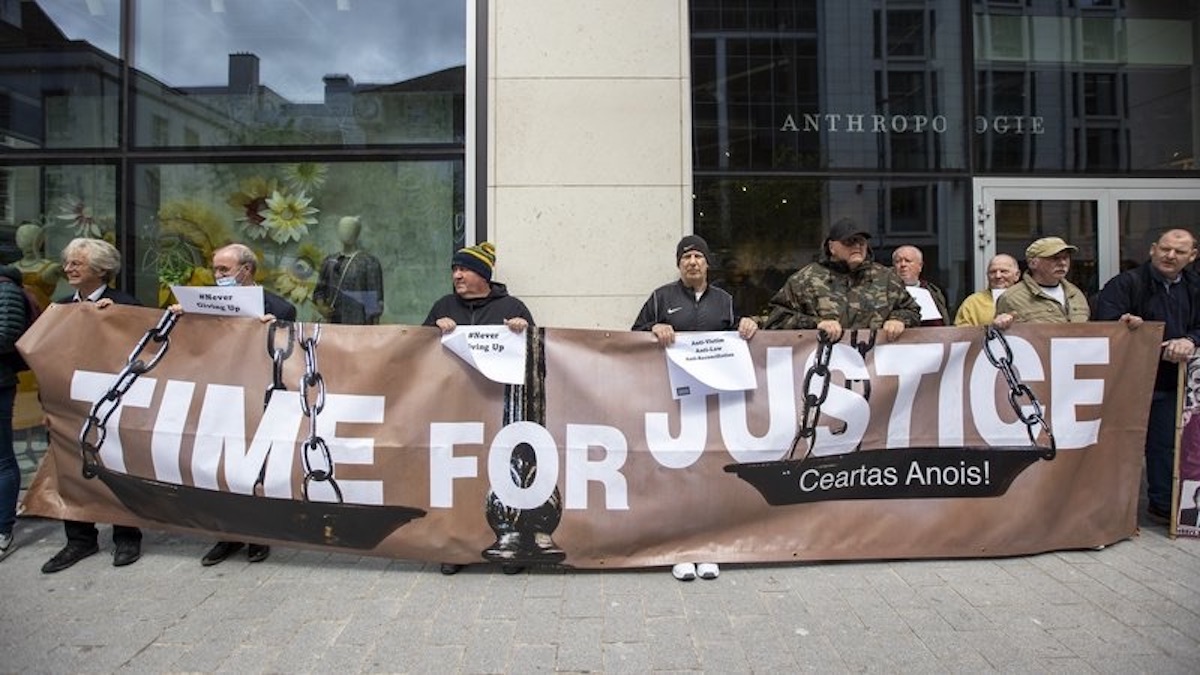
High-level protests are continuing over legislation currently being fast-tacked through Westminster to shut down investigations and provide an amnesty for Britain’s war criminals in Ireland.
The planned legislation has been branded ‘the bill of shame’ by campaigners as it will deny grieving families access to truth and justice via courts and inquests.
Opposition to the plan to rip up the 2014 Stormont House Agreement’s deal on legacy issues of the northern conflict could see the 26 County state take Britain to the European Court of Human Rights over the proposed legislation.
It has passed its second reading with the support of Conservative MPs, but was not backed by a single MP from the north of Ireland.
Tories hope the measures will “draw a line” under investigations into the ‘dirty war’ and end prosecutions of Crown Force personnel and their agents.
Adrian O’Neill, Ireland’s ambassador to Britain, condemned the bill’s “unilateralism.... “effectively repudiating the painstakingly negotiated 2014 Stormont House Agreement”.
“The processes outlined in this bill fall short of what was agreed in the SHA where we sought to guarantee the genuine independence of the investigations and information recovery arrangements,” he wrote.
He said legislation appears to give “wide powers” to London “to subsequently change or end this process after only a few years of operation.”
He said it is likely any new system will be taken to the courts and tested.
“If it fails there, it will have done nothing to resolve these legacy issues or progress reconciliation. It will only have added further years of limbo and heartache for families who have had far too much of both.”
Meanwhile, a number of experts and academics have agreed that the proposed legacy bill is in breach of the Good Friday Agreement and international human rights law.
A Westminster committee heard this week that the “Northern Ireland Troubles (Legacy and Reconciliation) Bill” is hopelessly incompatible with human rights.
Alyson Kilpatrick, Northern Ireland Human Rights Commissioner, gave evidence to a Westminster committee on Tuesday morning.
She said her concern was the attempt to channel all investigations, prosecutions, civil claims, inquests and police complaints into one body which would carry out meaningless “reviews”.
“What it also means is police will be prevented from investigating, the courts will be prevented from ruling, prosecutions will be prevented … that is a very substantial interference with the rule of law and with everything the UK has signed up to,” she told MPs.
“On its face, it clearly isn’t (human rights compliant), it’s clearly in breach of the Human Rights Act. She said she had not found “anything redeeming” in it.
The head of the Wave Trauma Centre Sandra Peake said the bill was “perpetrator-friendly... perpetrator-focused and ultimately the perpetrator will win from this – it won’t be the family [of the victims].”
Sinn Féin’s Linda Dillon described the testimony was “damning”.
“Boris Johnson’s government should listen to the voices of victims, families, political parties and the Irish government who are all opposed to these plans and want them scrapped,” she said.
“They are cruel, heartless and are about giving an amnesty through the back door for British state forces who murdered Irish citizens.
“An agreement for truth, justice and reconciliation was reached in 2014 by the parties and both governments at Stormont House, it should be implemented in full, in a human rights compliant manner.”
![[Irish Republican News]](https://republican-news.org/graphics/title_gifs/rn.gif)
![[Irish Republican News]](https://republican-news.org/graphics/title_gifs/harp.gif)

